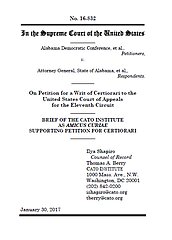Alabama Democratic Conference v. Attorney General, Alabama
Learn more about Cato’s Amicus Briefs Program.
The Alabama Democratic Conference (ADC) is a grassroots membership organization that specializes in outreach to black Alabama voters. Founded over 50 years ago, historians have called it “the most important black political interest group in the modern era of Alabama politics” and “the most influential black group in the state.” The ADC is organized as a political action committee (PAC), as required by state law. It frequently engages in get-out-the-vote drives, and for many years it was supported in this effort by donations from other political groups. In 2010, however, Alabama banned all transfers of money from any PAC to any other PAC, effectively shutting off half the flow of resources to the ADC. The group sued, but the U.S. Court of Appeals for the Eleventh Circuit upheld the transfer ban. The ADC is now asking the Supreme Court to review that decision, and Cato has filed a brief in support of that request. We make three points. First, the Eleventh Circuit wrongly characterized the ban as “only marginally impacting political dialogue.” In fact, the ban places a severe burden on the ability of groups to cooperate to further their shared speech goals. Just like in the business realm, different PACs possess different areas of experience; it makes little sense for other PACs to engage in the get-out-the-vote efforts in the black community that the ADC specializes in. This means that to cooperate and best achieve shared speech goals, reaching the optimal allocation of money across different PACs with different specializations is critical. Alabama’s transfer ban prevents groups from donating to those organizations that will best meet the pressing needs of any given political moment. Further, neither of Alabama’s proffered interests come close to the justifying this restriction on speech and association. Alabama suggests that the ban is necessary to prevent the “appearance of corruption,” which the Supreme Court has held can only arise from direct contributions to political candidates. Yet the ban applies to all political spending, even independent expenditures, which, by law, can’t be coordinated with political candidates. If the public is unaware of these anti-coordination laws, Alabama should inform them more clearly and dispel these corruption concerns. A state can’t justify a restriction on speech based only a public misapprehension. Finally, Alabama suggests that PAC-to-PAC transfers may obscure the original donor of funds, making campaign finance transparency more difficult. But once again, whatever interest Alabama may have in donor transparency, its solution was grossly disproportionate to the problem. Modern websites are perfectly capable of handling “big data” and presenting it in intuitive ways, and a campaign transparency website could easily be designed that presents the full history of a chain of donations to a user in a single click of a button. Banning PAC-to-PAC transfers to avoid modernizing a website is like banning home sales to avoid printing a new phonebook. The Supreme Court should take on this case and ultimately reverse the Eleventh Circuit.


